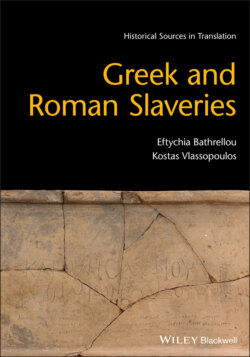Читать книгу Greek and Roman Slaveries - Eftychia Bathrellou - Страница 23
1.12 P.Herm. 18, 1–12: Papyrus with Record of Official Proceedings in Greek, Egypt (323 ce?)
ОглавлениеLiterature: Wolff 1966; Straus 2004a: 14–15.
[…] when […] were about to become consuls [for the third time], on the eighth day before the Ides of December, on the 9th day of the month Choiak.
When Firmus came forward and presented Patricius, the advocate, Clematius said: “Firmus, who came forward, has a slave called Patricius. Firmus has brought him here so that he be questioned on his status.”
The officials18 said to Patricius, “Are you slave or free?” He responded: “Slave.”
The officials said to him, “Whose slave?”
He replied, “Firmus’s.”
The officials said to him, “From which place did he acquire you?”
He replied, “From Reskoupos.”
The officials said to him, “From whom?”
He responded, “From Nikostratos.”
The officials said to him, “Is your mother a slave?”
He replied, “Yes.”
The officials said to him, “What is her name?”
He replied, “Hesychion.”
The officials said to him, “Do you have siblings?”
He replied, “Yes, one. His name is Eutychios.”
The officials said to him, “Is he a slave, too?”
He replied, “Yes.”
What kind of questions do the officials ask to establish the identity of the slave?
What questions do they ask concerning his family? What does this imply?
What question concerning his family do they not ask? What does this imply about natal alienation?
